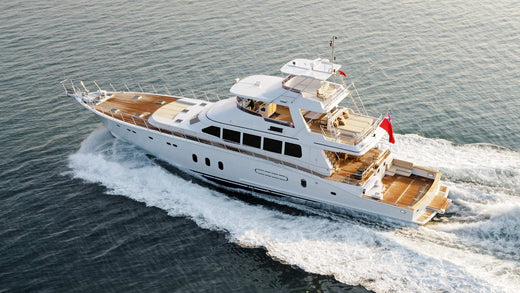
Want to Drive Your Own Yacht? Exploring the Maximum Boat Length Allowed
Nicholas HeislerShare this article
Standing at the helm of a yacht is a dream for many, but before you set sail, it's important to know the limitations and responsibilities that come with it. One common question among new yacht enthusiasts is: What is the maximum length to drive your own yacht? In this blog, we'll answer that question and explore the reasons behind the limits, along with other important considerations for yacht owners.
What Is the Maximum Length to Drive Your Own Yacht?
The maximum length of yacht you can drive by yourself is typically around 75 to 100 feet. This range is not a strict legal limit but rather a guideline based on practicality, regulations, and insurance requirements. Once a yacht exceeds this size, operating it yourself becomes significantly more complex, often requiring a professional captain and crew.
Why Does a Maximum Length Exist?
The existence of a maximum length for driving your own yacht isn't about a hard legal limit but rather about the increasing complexities and risks associated with operating larger vessels. As yachts grow in size, they become more challenging to handle, requiring advanced knowledge of navigation, docking, and maintenance. Larger yachts are more difficult to maneuver, especially in tight spaces or adverse weather conditions, and they often require specialized equipment and systems that are beyond the capabilities of a single person or even a small crew.
Licensing and Regulations: Most countries have regulations that dictate the qualifications needed to operate yachts of different sizes. For yachts over a certain length, typically around 24 meters (78 feet), captains may be required to hold a specific license, such as a Yachtmaster certification, which requires advanced training and experience.
Insurance Considerations: Insurance companies also play a role in determining whether you can drive your own yacht. Many insurers require that yachts over a certain length be operated by a licensed captain and crew. This is due to the increased risk of accidents, which can be costly and dangerous.
Safety and Crew Requirements: Larger yachts often require a crew to operate safely. Beyond just piloting the vessel, larger yachts have more complex systems, including advanced navigation, communication, and safety equipment that need constant monitoring and maintenance. A crew is also necessary to handle emergency situations, manage day-to-day operations, and ensure the comfort and safety of everyone on board.
Other Important Considerations
If you're considering driving a yacht close to the maximum recommended length, here are a few additional factors to keep in mind:
- Experience Level: Operating a large yacht requires a high level of experience. If you're relatively new to boating, it's advisable to start with a smaller vessel and gradually work your way up as you gain more experience.
- Maintenance: Larger yachts require more maintenance, both in terms of time and cost. This includes everything from regular engine checks to cleaning and maintaining the hull, electronics, and luxury amenities.
- Mooring and Docking: Finding suitable docking space for larger yachts can be challenging, especially in busy marinas. The cost of mooring also increases with the size of the yacht.
- Legal Requirements: Beyond licensing, be aware of any local or international regulations that may apply to operating a yacht of a certain size. This includes safety regulations, environmental laws, and restrictions on where you can travel.
Conclusion
The maximum length to drive your own yacht typically falls between 75 to 100 feet, influenced by factors like handling complexity, licensing requirements, and insurance stipulations. While it is possible to operate yachts within this size range without a professional crew, it demands a high level of experience, skill, and commitment. Before taking the helm of a larger yacht, consider all the associated responsibilities and ensure you're fully prepared for the challenges ahead.
For more information on boat ownership, licensing, and maintenance, explore our other blog posts. Happy sailing!
Related Posts You May be Interested in:
- Boat Cleaning Basics: How to Clean Your Boat From Top to Bottom
- Best Practices to Avoid Overloading Your Boat
- Debunking the Myth: Is it Bad Luck to Rename a Boat?
- What Kind of Boat Should I Buy? Exploring Your Options
When it comes to keeping your boat clean, look to Captains Preferred Products boat cleaning supplies. Find everything you need to keep your vessel squeaky clean all season - always at the best prices.









